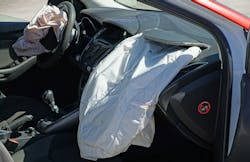According to a recent NHTSA update, nearly 17 million faulty Takata air bags are still in use, despite years of recalls. As of December 2018, at least 23 people had been killed worldwide due to faulty Takata air bag inflators, which have been found to explode with too much force, firing shrapnel at drivers and passengers.
The inflators grow more dangerous as they age, due to the fact that ammonium nitrate found within them deteriorates because of factors such as high humidity and cycles from hot temperatures to cold.
It’s an issue of great concern to Jack Gillis.
“The Takata situation is a bit unusual, because it’s so widespread,” says Gillis, the executive director of the Consumer Federation of America. “It’s really the sheer numbers of vehicles that are involved, and the fact that the industry was incapable of quickly supplying replacement parts.”
Gillis—a past NBC television consumer correspondent as well as a former executive director of the Certified Automotive Parts Association—currently serves as an advocate on issues relating to auto safety. He spoke with FenderBender recently, further examining air bag recalls that have greatly impacted the auto industry.
In your view, is there anything that could’ve been done to get this Takata air bag recall completed quickly?
Unfortunately, repairers’ hands have been tied by the fact that there simply aren’t enough replacement parts. So, there’s very little that collision repairers can do. It’s really up to the auto manufacturers to put pressure on the suppliers to get more replacement parts in the system.
What measures could be taken to get the public to respond to vehicle recalls more urgently?
First of all, often consumers don’t realize that their vehicle has been involved in a recall. So, collision repairers would be providing an excellent customer service if they checked their customers’ VIN numbers and informed them as to whether there are any open recalls. It’s an easy thing for repairers to do. And it’s a great service to their customer.
They should remind consumers that these repairs will be done by the manufacturer for no charge. The collision repairer can put themselves in a very good light with the consumer by No. 1, informing them if they have a recall, because many of us don’t get the notice. And, No. 2 that it’s going to be fixed for no charge if they bring it back to dealerships.
Why don’t consumers always receive the recall notice?
Well, I’m calling for a number of changes to the system. First and foremost, consumers are often notified by the manufacturer via traditional postal mail. And that mail can look like junkmail. So, consumers often miss it.
I’d like to see a system in place where, when consumers go to re-register their vehicles, the DMV will run a check on their vehicle—because they have the VIN numbers—and let consumers know that they have open recalls.
Are there ways that recall notices could be delivered that would better express the urgency of the matter?
We’d like to see a system set up by which the manufacturer notifies consumers via email. … every two months until the recall is resolved.
Again, like junk postal mail, junk email sometimes gets hung up. But, the more times, and the more often that you notify the car owner, the more likely they will be to respond to it.
Right now, there’s about a 70 percent response rate to recalls. But that still means that, when you consider how many million vehicles have been recalled, that there are still millions of unrecalled vehicles driving on the nation’s highways. And, not only is that a hazard for the owner of that vehicle, but for the rest of us driving around those vehicles.
What else needs to change with regard to how consumers are educated about vehicle recalls?
Well, most dealers are extraordinarily good marketers. They spend a lot of time and effort marketing their cars and their dealerships. They need to put that same time and effort into creatively communicating about recalls. So, it really can’t be a glossy promotional piece. It’s got to be a warning notice.
The car companies and the dealers need to package this information as if it’s a serious warning, and not a piece of junk mail.
Corporate America and the government have developed massive database and information systems for advertising, marketing and tracking purposes—it’s time to put those same systems in place for remedying recalls.
About the Author

